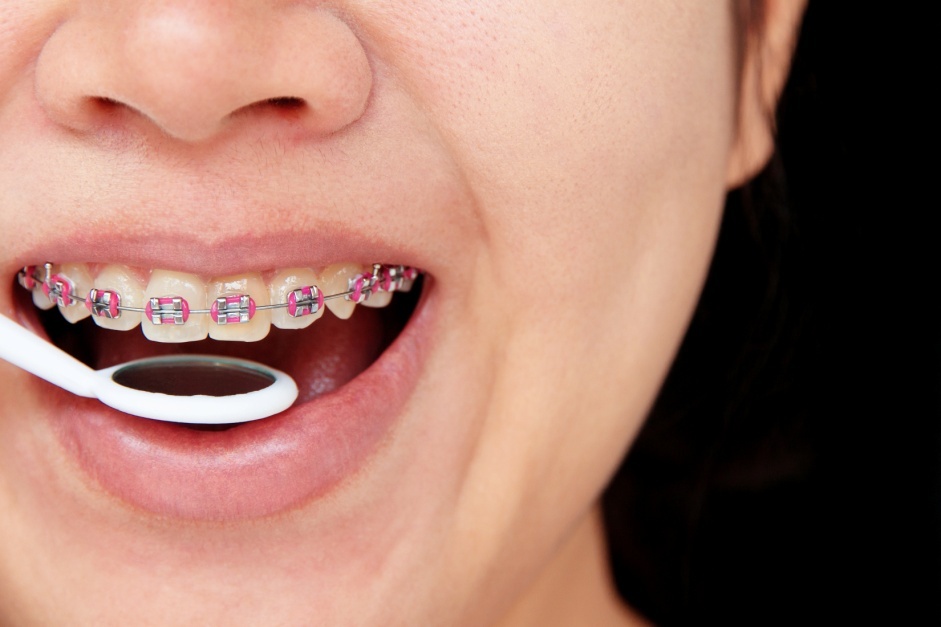Orthodontic Treatment
Orthodontic Treatment - 7 Common Questions You Might Have Before You Begin!
According to the American Association of Orthodontics, around 4 million Americans get some or other form of orthodontic treatment in their lifetime. Although getting braces is very common these days, it can be a scary thought because you are going to have to make significant changes in your lifestyle.
 Orthodontic braces on the upper front teeth
Orthodontic braces on the upper front teethOrthodontic Treatment
Here are a few questions that you might have about how braces work:
1. What Are the Types of Braces?
Depending on the severity of the malocclusion (misaligned teeth), and your individual needs, you have different options of braces available to you. But the most common type of braces is the metal-wire braces.
These braces can be used on mild to severe cases of misaligned teeth, and are the most inexpensive form of orthodontic treatment.
Other less common types of braces are as follows:
- Ceramic braces: A bit more expensive than metal braces, ceramic braces are less visible and blend into the color of your teeth.
- Lingual braces: The metal wires are placed behind your teeth, making them almost invisible. Since these braces are customized for your teeth, they are very costly.
- Clear aligners: Aligners can be used to treat mild cases of malocclusion, and are almost invisible on your teeth. Read about Invisalign braces HERE.
Orthodontic Treatment
2. Do Braces Hurt?
You may feel slight discomfort when the orthodontist is installing the braces. Once they are installed, it might take some time for you to get used to having a mouth full of metal and wires, leading to a little bit of soreness. Auxiliaries like elastics or rubber bands might also cause an initial period of discomfort. However, this can be taken care of with a little bit of dental wax and over-the-counter pain relievers.
Your follow-up visits might include changing to a stiffer archwire, which might cause you some discomfort until you get used to the pain.But don’t be scared -- though it might take you some time getting used to braces, after the adjustment period, you’ll hardly feel any pain, and you won’t even remember you have them!
3. Are Braces Just for Improving Your Smile?
Braces will make sure you have a picture-perfect smile. But there are other perks of orthodontic treatment. Having straight teeth means it’s easier to keep up with a better oral hygiene routine for a better smile.
Braces treatment will also make sure that there is less wear and tear on your teeth in the long run, and it will also eliminate issues like jaw pain or chewing difficulties that you might be facing because of your misaligned teeth.
4. Are Braces Only For Children and Teenagers?
Though it's ideal to get treated when you are a teenager, adults too can seek orthodontic treatment.
If you’re apprehensive about showing up with a metal mouth at work, you can always opt for more discreet forms of orthodontic treatment like lingual braces or invisible aligners. This way, no one will know you’re undergoing orthodontic treatment.
Orthodontic Treatment
5. How Long Will I Need to Wear My Braces?
The time period for your orthodontic treatment will depend on the severity of misaligned teeth and your unique case. The average time for traditional metal braces is 12 to 30 months.
6. How Often Will I Need to Visit My Orthodontist?
You will need to visit your orthodontist regularly to tighten your braces, the average of which is every 4 to 6 weeks. The time interval of your braces will depend on your unique case and the severity of your misaligned teeth.
7. What Changes Do You Need to Make in Your Lifestyle After Getting Braces?
You will need to make a few lifestyle changes once you get braces. This will start with giving up on foods that are hard, sticky, or chewy and likely to get stuck in the wires of your braces.
You will also need to keep up a strict oral hygiene routine with braces. You’ll need to start brushing, flossing after every meal, and use mouthwash. All this is done to make sure you don’t have a build-up of dental plaque, which can lead to cavities and more severe problems like gum disease.
Getting braces might seem overwhelming, but the end result is worth it-- you’ll have a perfect smile, and you’ll have better health! You can ask your orthodontist about any preconceived notion you might have about braces before you begin your orthodontic treatment to make sure you have a stress-free braces treatment.
Also, check out out our new page on Invisalign Braces treatment HERE.
Author Bio: Sharon Williams' day job is to handle digital marketing for Koch Orthodontics in Lawrenceville, GA. With a flair for creating compelling content that clears the clutter and connects with the audience in an instant, she writes about dental topics to educate and help her readers.
She truly believes that a genuine smile can win a million hearts and talks to her readers about improving their smiles and overall dental health, as well as enhancing their overall lifestyle. In her free time, she likes to organize small meets in her neighborhood where she brings people together to discuss various topics that she writes about.
 Author Sharon Williams
Author Sharon Williams


